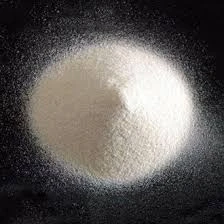
Сен . 19, 2024 00:33 Back to list
china hpmc-hydroxypropyl methyl cellulose supplier
HPMC A Versatile Polymer for Various Applications
Hydroxypropyl Methyl Cellulose (HPMC) is a cellulose-derived polymer that has gained significant importance in various industries due to its unique properties and versatile applications. As a water-soluble polymer, HPMC serves as an effective thickening agent, binder, and film-former. Its ability to enhance texture, viscosity, and stability makes it an essential component in numerous formulations.
What is HPMC?
HPMC is produced by the chemical modification of cellulose, a natural polymer sourced from plant fibers. By introducing hydroxypropyl and methyl groups into the cellulose backbone, HPMC exhibits improved characteristics such as water solubility, thermal stability, and resistance to microbial degradation. These modifications allow HPMC to dissolve in cold water, making it an ideal choice for various aqueous formulations.
Applications of HPMC
1. Construction Industry One of the primary applications of HPMC is in the construction sector as an additive in cement-based materials, such as mortars and tile adhesives. It enhances workability, prolongs open time, and improves adhesion properties. The water retention capability of HPMC ensures that the mixture remains workable for a longer period, which is crucial for construction projects.
china hpmc-hydroxypropyl methyl cellulose supplier

2. Pharmaceuticals In the pharmaceutical industry, HPMC is used as a binder in tablet formulations and as a controlled-release agent. Its biocompatibility and non-toxic nature make it suitable for various drug delivery systems. Additionally, HPMC is utilized in ophthalmic formulations and as a coating agent for tablets and capsules, enhancing their stability and patient compliance.
3. Food Industry HPMC is recognized as a food additive and is employed as a thickener, emulsifier, and stabilizer in various food products. It helps improve texture and mouthfeel while ensuring product stability. HPMC's safety profile has led to its widespread acceptance in the food sector, where it is used in sauces, dressings, and baked goods.
4. Cosmetics and Personal Care In the cosmetic industry, HPMC functions as a thickener and stabilizer in creams, lotions, and gels. It imparts a smooth texture and enhances the overall sensory experience of the product. Its film-forming properties make it a popular choice for products such as hair sprays and skin moisturizers.
Choosing the Right HPMC Supplier
For businesses looking to incorporate HPMC into their products, selecting a reliable supplier is vital. A reputable HPMC supplier should provide high-quality products that meet industry standards and regulations. Additionally, they should offer technical support and expertise to assist clients in optimizing their formulations.
In conclusion, Hydroxypropyl Methyl Cellulose is a versatile polymer with a wide range of applications across multiple industries. Its unique properties make it an attractive choice for construction, pharmaceuticals, food, and cosmetic formulations. As the demand for sustainable and effective ingredients continues to rise, HPMC is poised to play an even more significant role in the future of product development.
-
Versatile Hpmc Uses in Different Industries
NewsJun.19,2025
-
Redispersible Powder's Role in Enhancing Durability of Construction Products
NewsJun.19,2025
-
Hydroxyethyl Cellulose Applications Driving Green Industrial Processes
NewsJun.19,2025
-
Exploring Different Redispersible Polymer Powder
NewsJun.19,2025
-
Choosing the Right Mortar Bonding Agent
NewsJun.19,2025
-
Applications and Significance of China Hpmc in Modern Industries
NewsJun.19,2025







